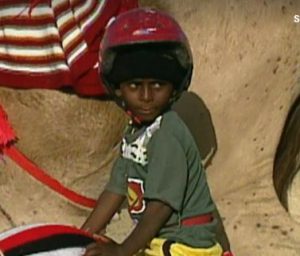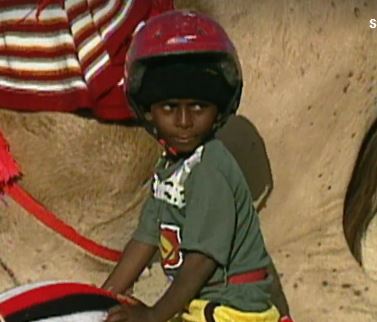Camel jockeys exemplify the difference between moral and shame cultures
A powerful HBO documentary about the beginning and end of using children as camel jockeys highlights the difference between Islam and Biblical morality.
 One of HBO’s better shows is Real Sports with Bryant Gumbel. It has a 60 Minutes format which sees it have three relatively “in-depth” stories per hour of show. Since I don’t follow sports, the stories are often new to me, so I learn from them. Some of them tremble on the line between pathos and bathos, but overall they’re interesting and humanist without tumbling into political correctness.
One of HBO’s better shows is Real Sports with Bryant Gumbel. It has a 60 Minutes format which sees it have three relatively “in-depth” stories per hour of show. Since I don’t follow sports, the stories are often new to me, so I learn from them. Some of them tremble on the line between pathos and bathos, but overall they’re interesting and humanist without tumbling into political correctness.
And sometimes, it turns out, a story can change the world. Just recently, I learned about one such story.
The story I’m about to tell you actually began in 2004. That was when Real Sports aired an expose about camel jockeys in the United Arab Emirates, a deeply Muslim country. Someone has that expose on video and, while the picture quality is poor, I recommend watching it:
If you do not have the time to watch, the ability to watch, or the desire to watch, I’ll sum it up quickly: At the time this video was made, in both the UAE and entire the Arab Peninsula, the ubiquitous camel races that are integral to these desert societies relied on child jockeys to ride the camels in the races. The trainers, with the knowledge and complicity of the fabulously wealthy sheikhs who owned the camels, would kidnap or buy young boys from the poorest places in the world to train as jockeys.
When I say “young boys,” I do not mean ten- or twelve-year olds. I mean two-, three-, or four-year olds. These enslaved children were then housed in compounds where they would do endless menial labor caring for the camels, were systematically starved and drugged to stunt their growth, and slept in the outdoors on the dirt, because the inner buildings of the compounds were used for corporal punishment (whipping and hanging in chains) and for rape.
When they were not in the compounds, these boys, some only in the late toddler stage of development, were tied to the camels’ backs in 110 degree temperatures, taught to apply the whip and follow simple orders screamed at them from sheikhs and trainers thundering along beside the race track in SUVs, and let loose as those great lumbering beasts charged down a sandy track. If the boys fell off the camels and died . . . so what? It was easy enough to replace them.
The 2004 documentary (above) focused on the efforts of one man, Ansar Burney who, along with his wife, made it his mission to rescue these boys. There is no room in this post to describe Ansar Burney’s humanitarian activities. Suffice to say that the Wikipedia article to which I linked introduces him as follows: “He is widely credited as being the first man to introduce the concept of human rights in Pakistan nearly 30 years ago.”
Burney has not limited his efforts to Pakistan. They reach out across the longitude from India to North Africa, as well as to points both north and east of that cruel longitude. If you ever need a little more ammunition to discredit the Nobel Peace Prize committee, think of this: Barack Obama (who ultimately did more to destabilize the world and rain death on people throughout those same longitudes than any other president in America history) got a Nobel Peace Prize and Ansar Burney, to date, has not.
But here’s the good news: What I learned watching the most recent episode of Real Sports, which includes both the original documentary and an update, is that the 2004 documentary brought about real change. For once, this is not the media’s usual self-serving hyperbole. That documentary was the direct catalyst to change because a Crown Prince in the UAE watched the episode with his nine children. His children were shocked by what they saw and, according to the Crown Prince, pressured him to bring an end to the camel jockey practice. Or, as someone in the show said, the Prince was embarrassed. (More about that in a minute.)
Although the UAE, in 2004, did have a new law on the books ostensibly outlawing child jockeys, it had never been enforced. Thanks to the documentary and Burney, the UAE for the first time acted to end this brutal slavery, something that enraged many of the UAE’s sheikhs. Indeed, the Prince (to his credit) asked Burney himself to oversee the destruction of the camel jockey program.
Ultimately, more than 4,000 boys were freed and returned to their families, along with some money to help them create a new life. Many bear the horrible scars of their enslavement (including badly stunted growth and the scars from injuries or beatings), but they know that they were given a second chance and most try to make the most of it.
Ironically enough, with slaves no longer an option, the sheikhs found something better: robots. Instead of a terrified, starved, abused three-year-old on the camel’s back, there is a lightweight robot (weighing less even than the most starved child), that can be controlled from one of those SUVs tearing along the side of the racetrack. When robots fall off and get killed, there is no pain or horror. You just get another robot. The robots have been so effective that they’ve replaced child jockeys throughout the Arabian peninsula.
I am not someone much given to tears, but I cried with Burney when he thanked God for the miracle that saw these boys liberated. What we were watching was the end of one of the most evil practices on earth — and one, moreover, that is evil not just by modern standards but that would be evil in all times and all places. This staggering brutality to infant boys is the antithesis of the Golden Rule. It is the denial of the belief — a belief the Jews originated and the Christians accepted — that we are all precious individuals. Those who abuse individuals for their own selfish pleasure are — there is no other word for it — evil.
If you’re wondering about my post title (“Camel jockeys exemplify the difference between moral and shame cultures”), I’m finally getting to that point. It’s important (to me, at least) to note that what ended the child camel jockey tradition in the UAE was not that the Prince or his sheikhs had a moral epiphany that what they were doing was evil. Instead, having their behavior exposed to the world through the HBO special shamed them. Moreover, with a moral world watching them, they realized that they could not find a credible, cross-cultural excuse to justify their behavior. To regain face, the only thing they could do was end the practice. And to my mind, that’s where Islam has a problem.
It is true that Islam has a few statements urging humane behavior. I can’t find the quotation now, but there is a verse telling Muslims that they will be rewarded for treating women and children well, although I believe the context extends only to Muslim women and children. Moreover, this throwaway line is still inextricably intertwined with all sorts of Prophet-given mandates (meaning that one cannot interpret them in a softer, more symbolic way) that reduce women and children to the level of chattel and, in the case of women, sex slaves (whether Muslim or not).
Fundamentally, Allah is not a moral God. Instead, he is an instructional God. Do this. Don’t do that. Follow orders. Submit. The only absolute in Islam is to worship Allah and follow precisely the Prophet’s mandates.
Again this is not to say that individual Muslims cannot be highly moral and decent in their conduct (or to say that all people who practice the Judeo-Christian faith are so highly moral and decent). Regarding Muslims, witness Ansar Burney as the exemplar of a true humanist who values the individual. Conscience is a powerful thing, especially for those Muslims who, although faithful, were educated in the Western tradition, as Burney obviously was.
This lack of firm moral compasses is the most profound way in which Islam differs from the Biblical tradition that still infuses American culture, despite the Left’s ongoing efforts to erase the Biblical tradition from the West. The Jewish God is an outrageously moral God. It’s this reason, as I’ve long said, that people hate the Jews: The Jews, through their God, stand for justice. That is an abstract principle that stands outside of shame or other internal emotions. It is also the Jewish Bible that introduced the notion that individuals have value and that there are external standards of morality unrelated to whether a specific pagan gold is angry or feeling comfortably full after enjoying a nice human sacrifice.
Although slavery existed for thousands of years after the Bible’s inception (including Jewish slave owners), the Jewish Bible was the first to recognize that slaves are still individuals created in God’s image. To that end, it demanded that they must be treated humanely. That concept did not take hold in the West until the late 18th century and, as we see, still hasn’t taken hold in the Middle East, Africa, Pakistan, and India. It was not a sense of the boy’s humanity as children of God (or Allah) that ended child slavery in the UAE and surrounding countries. It was shame and technology, rather than morality that made the difference.
Dennis Prager has a marvelous video explaining that, without a just and loving God, there is no good and no evil. There can therefore be no morality as we know it:
Prager’s video explains better than I ever could the moral underpinnings of Western civilization (a morality that underlies the thoughts of even those who claim themselves to be absolute atheists). Taking together the video and the camel jockeys story should help convey the point I’m rather awkwardly trying to make about the absence of morality in Islam. Again, I’m not saying that individual Muslims lack decency. I am saying, though, that Islam has no objective morality that lies outside of each individual and judges all equally. Pair this with the fact that Islam has nothing that corresponds to the Judeo-Christian’s recognition of the worth of the individual, and you have a situation ripe for the worst kind of child abuse.
*****


